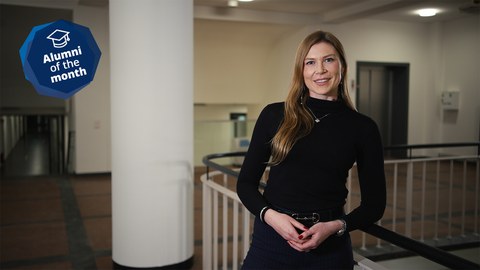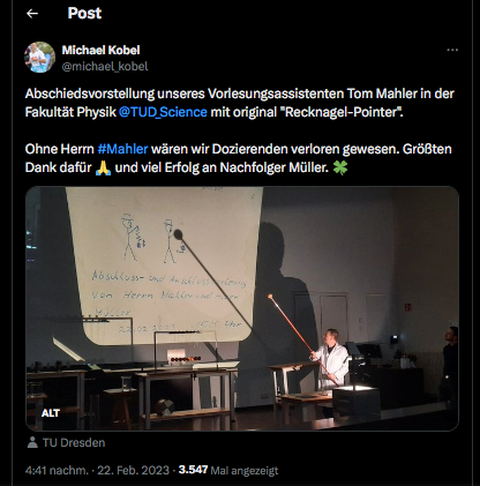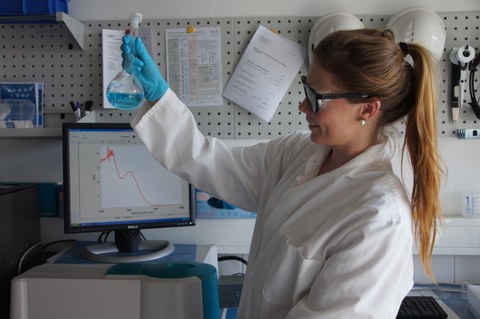Your (career) path is forged by walking it.
Thomas Scheufler
(interviewed in the year 2024)
As a child, Dr. Claudia Zech wanted to understand thoroughly how things work – and not merely learn by heart. She studied Physics at TU Dresden and graduated with a Master's degree. She now works as a management consultant in the battery industry and gives tips on STEM degree programs on social media.

Claudia Zech is the Alumna of the Month October 2024.
| Profile | Dr. Claudia Zech |
| Degree program | Physics (Bachelor’s, Master of Science) |
| Faculty | Physics |
| Study period | 2009 - 2014 |
| Current work | Management consultant |
Why did you decide to study at TU Dresden?
Before I started my studies, I visited two universities during their open days. TU Dresden won me over both because of the campus and the city. Also, some of my friends already lived in Dresden. I moved into a shared flat with them and we would travel home together on the weekends.
What made you choose this degree program?
I’ve been interested in science, technology, and outer space since my childhood. Since I always enjoyed solving puzzles, figuring things out and understanding them thoroughly, and didn't want to spend my time learning by heart, I thought physics was the best choice.
What researchers or lecturers influenced you the most during your studies?
In fact, there are many lecturers who I remember because they taught their subject with passion and soul. Dr. Mathias Dörr helped us understand vacuum physics by saying, “Imagine you’re a helium molecule.” Prof. Clemens Laubschat and Tom Mahler made experimental physics accessible and understandable for us – as a result, I’ll never forget the conservation of angular momentum. Prof. Stefan Sigmund filled us with a mixture of awe and admiration for analysis and also for the speed of his handwriting. Prof. Michael Kobel introduced us to particle physics by taking us to CERN. And with Dr. Jürgen Henniger, I wrote my Bachelor's and Master's thesis in the field of radiation physics, which prepared me for starting my career.

Farewell performance of Tom Mahler
(Text: Farewell presentation of our lecture assistant Tom Mahler in the Faculty of Physics @TUD_Science with original “Recknagel-Pointer” Without Mr. #Mahler we lecturers would have been lost. Many thanks for this and good luck to his successor Müller.)
Where are you employed today, and what are your responsibilities?
After doing my PhD at Synchrotron BESSY II in Berlin and working in research as a post-doc for two years, I switched to management consulting. I've been working in technical consulting in the field of battery production for two years now. I also give advice on STEM degree programs on social media and offer mentoring.
What advice would you give to our current first-years?
Not only to graduate successfully – but rather to enjoy it at the same time – I always recommend asking yourself: what subject can you work on every day without getting bored? Because you will only be happy in the long-term if you're doing something you're passionate about. One tip I have is to write as many notes as possible, because most people learn this way. In addition, every student should look for a study group. This saves a lot of time compared to trying to teach yourself everything and is also a lot of fun. And you should pay special attention to practicals, because they are the best preparation for the exam. And don’t panic if there’s a day or a week when you don’t understand anything – this happens to almost everyone who studies physics and is completely normal. And don’t be afraid to ask the lecturer questions if there’s something you didn’t understand or want to have explained again. Never lose sight of the fun side of things and don't miss uni parties. Last but not least, while studying don't worry too much about what job you will do in the future. Your path is forged by walking it. Enjoy your student days.
Studying physics, particle acceleration & management consultancy: Interview with alumna Dr. Claudia Zech © TUD, Karl Donath
What do you remember most fondly about your time as a student?
The highlight was definitely the study trip to CERN, where we got a first impression of what the day-to-day work of a physics researcher can look like. We were also able to experience in real life what we had only learned on paper and that gave us a real motivation boost.
What was your favorite place on campus?
The entrance area of the SLUB library, where we used to meet with our study group and struggle over the exercises. During our study breaks, we always went to the SLUB café or the SLUB meadow for a delicious piece of cake.
What still has a lot of value for you today/would you like to have had more of?
That we always experience the greatest joy when we complete particularly difficult tasks – which usually require patience and discipline. Also, small setbacks, like a bad grade or even failing an exam, are no reason to doubt yourself or your abilities – they are just part of the learning process.
What tips do you have for hitting the ground running in your industry?
As a physicist, many doors are open to you in a wide variety of careers. Therefore, you should first get to know exactly what it is like to work in the position you want to apply for. The daily routine of a researcher in a lab is very different from that of a management consultant. And also, be sure to ask all your unanswered questions in the job interview, because it's not only you who has to be a good fit for the company, the company also has to be a good fit for you.
What connects you to TU Dresden today?
A lot of very, very lovely memories. Whenever I was re-visiting Dresden, I always took a walk through the campus and enjoyed reminiscing about my student days.

As a physicist, many doors are open to you in a wide variety of job areas, says Dr. Claudia Zech.
Contact:
Claudia Zech
